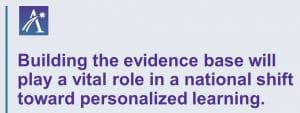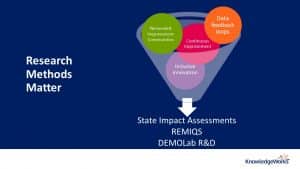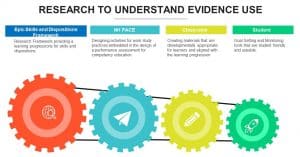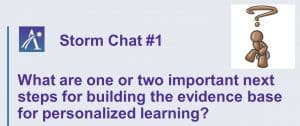National Research Convening on Building the Evidence Base for K-12 Personalized Learning: Overview and Session Materials
CompetencyWorks Blog
 The National Research Convening on Building the Evidence Base for K‐12 Personalized Learning was held on October 20 as a pre-conference event for the Aurora Institute Symposium. This blog post provides a brief summary of each session. Videos and slide decks are available here, and the convening agenda is here.
The National Research Convening on Building the Evidence Base for K‐12 Personalized Learning was held on October 20 as a pre-conference event for the Aurora Institute Symposium. This blog post provides a brief summary of each session. Videos and slide decks are available here, and the convening agenda is here.
Achieving a national shift toward personalized learning will require additional evidence of its effectiveness and deeper utilization of existing knowledge. With that in mind, the convening’s goals were to strengthen knowledge and communication of the evidence base and build understanding of how to increase its usefulness for educators and school leaders. The event was by invitation and convened more than 60 researchers and 40 other educators, administrators, communications professionals, funders, and leaders of education organizations who are building, sharing, and utilizing the evidence base. The Leon Lowenstein Foundation generously sponsored the convening.
Opening Session
Susan Patrick, President/CEO – Aurora Institute
Discusses the importance of building the evidence base for K-12 personalized learning, explains how the field has advanced over time, and provides an overview of the event.
Stewart Hudson, Executive Director – Leon Lowenstein Foundation
Explains the Foundation’s strong commitment to supporting the development of an evidence base for personalized learning that is accessible, equity-focused, and high-quality to advance the field.
Keynote – How Will Your Research Narrate Our History?
Jilliam Joe, Senior Director of Learning Insights and Research – LEAP Innovations
Encourages us to have hard conversations about equity and personalized learning research and take decisive action. We need to ask, “Does the practice help to create more equitable and inclusive environments that honor every child’s identity and bolsters their social and cognitive development? Moreover, do these practices help to close the opportunity gap between White, Black, and Brown children?”

Research Sessions
How Do We Measure Personalized Learning? Insights from Social, Emotional and Academic Development and the Learning Sciences
Robert Balfanz, Research Professor – Johns Hopkins University School of Education
To build an evidence base for personalized learning, we need to have an idea of how to measure it. Robert Balfanz shares a series of propositions and findings to generate thinking on this important topic. A key point is that “to spread personalized learning approaches from early adopters to the mainstream, we need to be able to show a range of stakeholders … that it leads to better outcomes than more customary approaches and is worth the effort and expense involved.” Balfanz explores how to address this need, particularly through the lens of measures of personalized learning that already exist, are under development, or are needed but not yet available.
Mastery‐based Education with a Culturally Responsive Imagination: Remarks on Early Research
Lindsey Foster, Research Associate; Pamela D’Andrea Martinez, Graduate Student Researcher; Leah Q. Peoples, Assistant Director of Research to Practice – NYU Metropolitan Center for Research on Equity and the Transformation of Schools
Joy Nolan, Director; Meg Stentz, Associate Director – Mastery Collaborative, New York City Department of Education
The Mastery Collaborative and NYU Metro Center teams recently completed a study of mastery-based and culturally responsive practices through the Student-Centered Learning Research Collaborative. They discuss mastery learning and the three pillars of culturally responsive education named by Gloria Ladson-Billings: academic success, cultural competence, and critical consciousness. In their deliberate work to move toward equity “with clarity, power, and determination,” the team has asked whether infusing culturally responsive education into mastery learning has gotten them closer to equity, and how the work has progressed so far.
Democratizing Research: Foregrounding Positionality and Process in Responsive Investigations
Eric Toshalis, Senior Director; Rebecca E. Wolfe, Vice President – KnowledgeWorks
Transformative, democratized research needs to be responsive to the end user. Eric Toshalis and Rebecca Wolfe set out a high-level framework of what they have found works to accomplish this, through their work with KnowledgeWorks and the Student-Centered Learning Research Collaborative (SCLRC). Primary strategies focus on process, methods, building skills, and amplifying voice. Important questions for democratizing research include: Who is constructing the research questions, designing and carrying out the research, and making meaning out of the findings? How can researchers amplify voices that are already there? Toshalis and Wolfe discuss methods and ongoing SCLRC projects that have been conducive to ensuring community input and inclusion.

Improving Equity in Personalized Learning through a Multi‐Tiered System of Support (MTSS) Approach
Eva Dundas, Chief Learning Officer – Branching Minds
Eva Dundas explains that an MTSS approach helps to build the infrastructure and systems needed to implement personalized learning effectively and efficiently at scale. She presents data from 300,000 students showing where there are large inequities in the implementation of personalized learning and highlighting the need for stronger student and educator supports. Within a data-driven MTSS framework, educators in her study were able to facilitate personalized learning more equitably and significantly reduce the racial achievement gap.
Measuring Personalized Professional Learning: A Three‐Year Study of What Works Best, For Whom, Under What Conditions, and Why
Beth Holland, Partner; Ling Zhang, Research Assistant – The Learning Accelerator
Amalia Lopez, Director of Special Projects – Lindsay Unified School District
The Lindsay Unified School District in central California has spent more than a decade deepening their model of personalized, competency-based learning. More recently they have applied their personalized approach to professional learning, enabling educators to select from a variety of development opportunities to improve their effectiveness. Beth Holland, Amalia Lopez, and Ling Zhang discussed a series of studies they have carried out to understand which professional learning pathways have been most effective in increasing learner growth. The reports from these studies are available here.
Work‐Study Practices in New Hampshire: Validation Dialogues between Practice and Research Expertise
Anthony Doucet, Teacher – Souhegan High School, New Hampshire
Paul Leather, Director of State and Local Partnerships – National Center for Innovation in Education
Felicia Sullivan, Associate Research Director – Jobs for the Future
Jonathan Vander Els, Director of Innovative Projects; Kathy White, Director of Innovative Projects – New Hampshire Learning Initiative
Nicole Woulfe, Teacher – Sanborn Middle School, New Hampshire
Competency-based education was established by law in New Hampshire in 2005. A decade later, the U.S. Department of Education granted the state a waiver to implement performance assessment of competency-based education (PACE) as an alternative accountability system. In addition to academic content, part of this work has been to develop strategies for students to be able to validly and reliably demonstrate personal success skills or “work-study practices”—communication, self-direction, collaboration, and creativity. In this presentation, the members of the research-practice partnership developing this work report on their progress and findings. Some in-depth products of this work can be found in the BEST Self-Direction Toolkit. 
Communications Session
School and District Leaders
Cederick Ellis, Superintendent – McComb School District, Mississippi
Ruth Hellams, Principal – Del Lago Academy Campus of Applied Sciences, California
Jeff Heyck‐Williams, Director – Two Rivers Learning Institute
To have its intended impact on student learning, the evidence base for personalized learning needs to be utilized by educators and school leaders. Three leaders from schools and districts that are implementing personalized competency-based education deeply discuss research on personalized learning they have used and what has made it most useful for them and their colleagues.

Communications Professionals
Emily Bader, Senior Director, Marketing Communications – LEAP Innovations
Kira Keane, Managing Partner, External Relations – The Learning Accelerator
Kate Westrich, Vice President, Marketing and Communications – KnowledgeWorks
Effective dissemination of the evidence base for K-12 personalized learning is another essential element to ensure that research is utilized by key stakeholders for policy and practice. Three communications professionals from leading organizations in the field discuss and demonstrate the wide range of strategies they use to disseminate research findings on personalized learning implementation and outcomes.
Closing Session
To close the convening, attendees responded in the chat box to prompts about next steps in building the evidence base for personalized learning and their most valuable learning from the convening. In the video, the chat box entries scroll past as attendees say more about what they wrote and respond to each other’s comments.

Learn More
- How Will Your Research Narrate Our History?
- Equity-based Educational Research: Emerging Lessons from City Year’s Work
- New Hampshire’s Work Study Practices – A Five-Year Journey to Understand, Share, Scale, Deepen, and Meaningfully Assess These Critical Competencies
Eliot Levine is the Aurora Institute’s Research Director and leads CompetencyWorks.